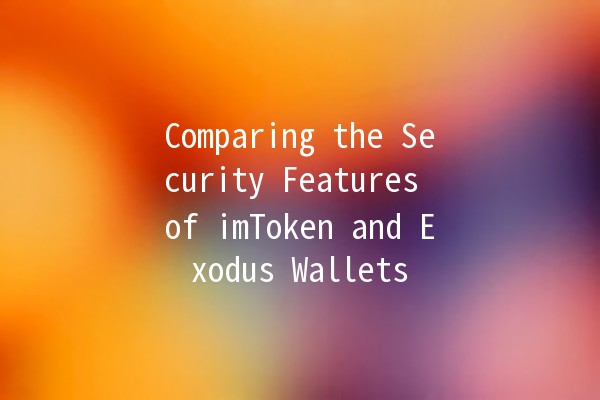When choosing a cryptocurrency wallet, security is one of the most critical factors to consider. With the increasing threats of hacks, scams, and security breaches in the digital currency space, users must be vigilant and wellinformed. In this comprehensive comparison, we will delve into the security features of two widelyused wallets: imToken and Exodus, highlighting what sets them apart while providing practical tips for enhancing your security.
imToken is a mobile wallet designed primarily for holding Ethereum and ERC20 tokens. Launched in 2016, it has quickly gained popularity in the Asian market, particularly in China. The wallet emphasizes usability while maintaining a focus on security, offering features such as multichain support, decentralized exchange access, and robust asset management functionalities.

Exodus is a multicurrency wallet available on both desktop and mobile platforms. It supports a wide range of cryptocurrencies, including Bitcoin, Ethereum, and many others. Exodus stands out with its userfriendly interface, seamless exchange features, and dedicated customer support. Security is a top priority for Exodus, which incorporates various protocols to protect users' assets.
imToken
Users have complete control over their private keys in imToken. Upon wallet creation, a unique seed phrase is generated, which is critical for asset recovery. The imToken team emphasizes that no personal information is collected, and users are solely responsible for their keys.
Exodus
Exodus also allows users to manage their private keys independently. Users receive a seed phrase when setting up their wallets, enabling them to restore access if they lose their device. However, the wallet includes a backup feature that can securely store multiple wallet backups in the cloud.
Security Tip: Regardless of the wallet, always securely store your seed phrase offline. Consider using a hardware wallet for additional protection.
imToken
imToken does not currently support MultiFactor Authentication (MFA) directly within its application. However, it encourages users to create strong, unique passwords to safeguard their accounts.
Exodus
Exodus offers the option to set a password for accessing the wallet but does not support MFA. However, users can enhance their security by enabling biometric authentication on mobile devices, which provides an extra layer of protection.
Security Tip: Always use strong, unique passwords for your wallet and enable biometric authentication if available. For even better security, consider using a password manager to generate and store your passwords.
imToken
The wallet provides a straightforward backup process through the seed phrase. Users are reminded to write down their seed phrase immediately after wallet creation to prevent any loss of access.
Exodus
Exodus similarly uses a seed phrase for recovery and offers an easy stepbystep process for creating backups. Additionally, it provides a backup feature that allows automatic cloud backup setup for convenience.
Security Tip: Regularly test your backup process to ensure you can recover access to your funds whenever needed.
imToken
imToken employs AES256 encryption to protect user data locally. This means that sensitive information such as private keys and transaction histories are encrypted to prevent unauthorized access.
Exodus
Exodus also uses encryption to secure the wallet. However, it operates on a clientside encryption model, meaning that only the user has access to their private keys and recovery phrases, making unauthorized access even more difficult.
Security Tip: Ensure that your device operates with the latest security updates and firewall protections to prevent thirdparty access to your wallet information.
imToken
imToken is not open source, meaning that its code is not publicly available for security audits. However, the company frequently releases updates and security patches.
Exodus
Exodus is partially open source, which allows for some level of community scrutiny. This transparency can build trust among users, as independent developers can audit the code for vulnerabilities.
Security Tip: Consider the transparency of a wallet's code as an important factor in your decision. Opensource wallets often give users added confidence regarding security.
Both imToken and Exodus have implemented robust security protocols, but mobile wallets are more vulnerable than hardware wallets. If you hold significant amounts of cryptocurrency, using a hardware wallet is advisable.
Both wallets provide a seed phrase during setup, which allows for recovery on any device. Keep this phrase secure, and you can restore access to your cryptocurrencies using it.
Yes, both wallets offer trading functionalities. imToken has integrated decentralized exchanges, while Exodus has a builtin swap feature that allows for efficient trading between supported cryptocurrencies.
Both wallets are userfriendly, but Exodus may be slightly more accessible for beginners due to its intuitive interface and customer support. imToken is great for Ethereum users specifically for its extensive Ethereum support.
Regularly check for updates, use strong passwords, enable all possible security features, and remain informed about walletspecific vulnerabilities to ensure optimal security.
Immediately transfer your assets to a secure wallet. Contact your wallet provider’s support team for further assistance and to understand any next steps you should take.
By understanding these security aspects of imToken and Exodus, users can make informed decisions on which wallet best fits their needs while implementing strategies to safeguard their digital assets effectively. Always prioritize security in any digital currency dealings, and stay informed about new developments in the cryptocurrency world.